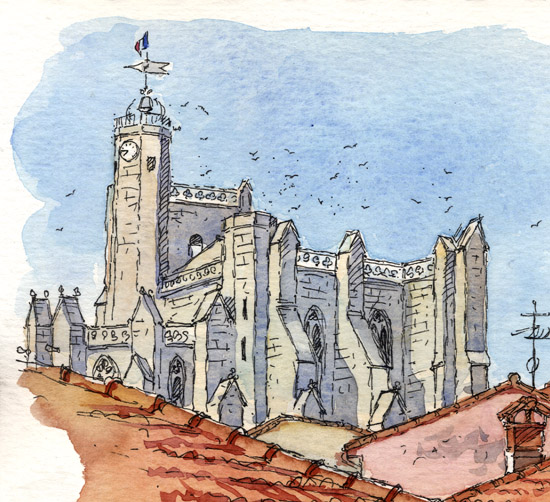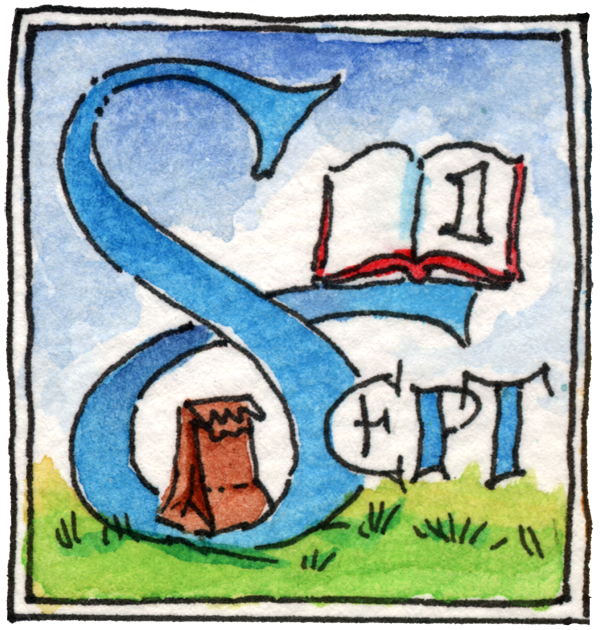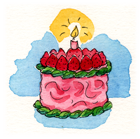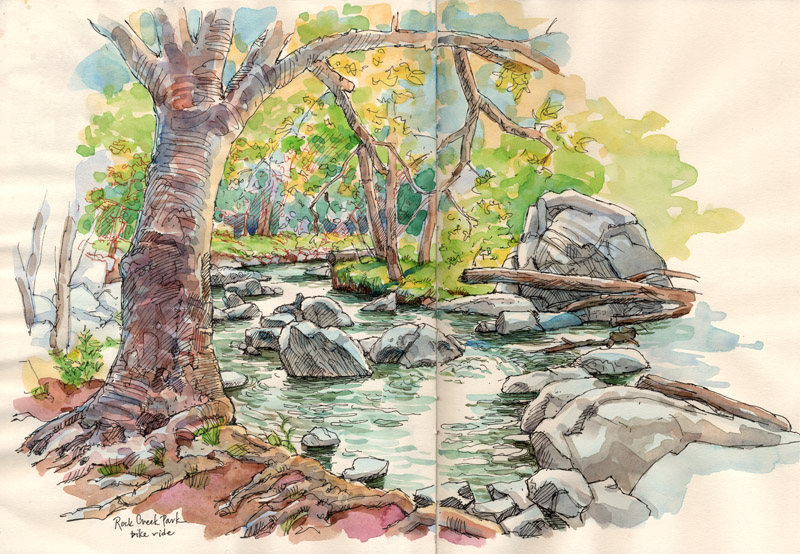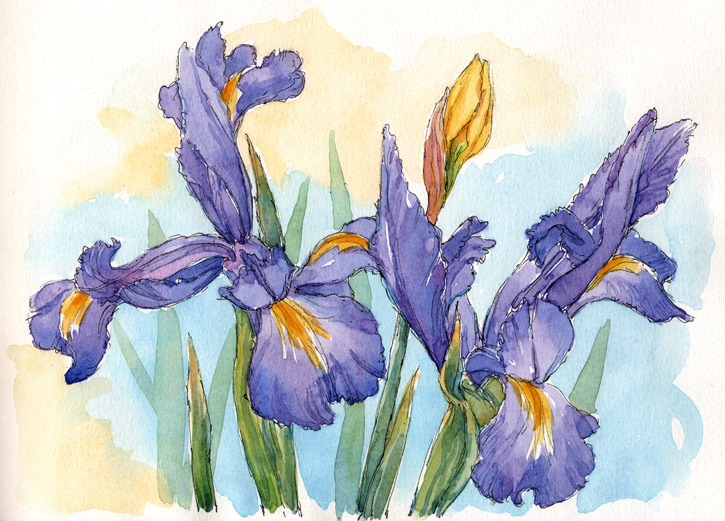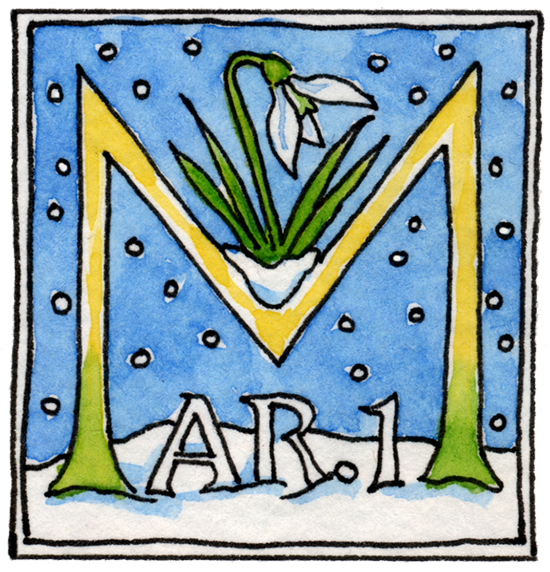As part of my continuing obsession each December to remind the world about the discovery of the TRUE author of the beloved Christmas poem “A Visit from St. Nicholas,” I cannot resist once more posting a link to the story. Naughty, naughty, Clement Clarke Moore. No golden walnut for YOU.
Tag: Poetry
Bringing the Sun
For the birthday today of Christina Rossetti (1830-1894), I post this poem, and a detail of a sketch from my France 2013 sketchbook, for those already missing the swallows and the summer sun. (For the entire sketch, please see View from the Terrace.)
Fly away, fly away over the sea,
Sun-loving swallow, for summer is done;
Come again, come again, come back to me,
Bringing the summer and bringing the sun.
—Christina Rossetti
Where There Is Darkness, Light
For the the Feast of St. Francis of Assisi today, I post a painting from the series of Washington National Cathedral, where this coming Sunday you can take your pet to be blessed in honor of that kindly friend of all living creatures.
I also post below the well-known Prayer of St. Francis, which might come in handy at this time if distributed among the less law-abiding members of Congress.
Lord, make me an instrument of Thy peace;
where there is hatred, let me sow love;
where there is injury, pardon;
where there is doubt, faith;
where there is despair, hope;
where there is darkness, light;
and where there is sadness, joy.
O Divine Master,
grant that I may not so much seek to be consoled as to console;
to be understood, as to understand;
to be loved, as to love;
for it is in giving that we receive,
it is in pardoning that we are pardoned,
and it is in dying that we are born to eternal life.
—St. Francis of Assisi
To a Young Child
For the autumn equinox today, a poem by Gerard Manley Hopkins, and a painting.
Márgarét, are you gríeving
Over Goldengrove unleaving?
Leáves líke the things of man, you
With your fresh thoughts care for, can you?
Áh! ás the heart grows older
It will come to such sights colder
By and by, nor spare a sigh
Though worlds of wanwood leafmeal lie;
And yet you will weep and know why.
Now no matter, child, the name:
Sórrow’s spríngs áre the same.
Nor mouth had, no nor mind, expressed
What heart heard of, ghost guessed:
It ís the blight man was born for,
It is Margaret you mourn for.
—Gerard Manley Hopkins
September, The First Day Of School
I
My child and I hold hands on the way to school,
And when I leave him at the first-grade door
He cries a little but is brave; he does
Let go. My selfish tears remind me how
I cried before that door a life ago.
I may have had a hard time letting go.
Each fall the children must endure together
What every child also endures alone:
Learning the alphabet, the integers,
Three dozen bits and pieces of a stuff
So arbitrary, so peremptory,
That worlds invisible and visible
Bow down before it, as in Joseph’s dream
The sheaves bowed down and then the stars bowed down
Before the dreaming of a little boy.
That dream got him such hatred of his brothers
As cost the greater part of life to mend,
And yet great kindness came of it in the end.
II
A school is where they grind the grain of thought,
And grind the children who must mind the thought.
It may be those two grindings are but one,
As from the alphabet come Shakespeare’s Plays,
As from the integers comes Euler’s Law,
As from the whole, inseparably, the lives,
The shrunken lives that have not been set free
By law or by poetic phantasy.
But may they be. My child has disappeared
Behind the schoolroom door. And should I live
To see his coming forth, a life away,
I know my hope, but do not know its form
Nor hope to know it. May the fathers he finds
Among his teachers have a care of him
More than his father could. How that will look
I do not know, I do not need to know.
Even our tears belong to ritual.
But may great kindness come of it in the end.
—Howard Nemerov
Through Hills and Seas to the Universe
I carved out some time on my birthday to sit in the garden, despite deadlines, mosquitoes and heat, to sit and sketch. It was quiet except for the chirping of birds (especially numerous in our tiny garden this spring) and the distant hum of air-conditioners along the alley. Even a short time spent among growing things is restorative. I share the sketch and this poem.
The trees put forth luxuriant foliage,
the spring begins to flow in a trickle.
I admire the seasonableness of nature
and am moved to think
That my life will come to its close.
So little time are we granted human form in the world.
My eyes wander
over the pictures of hills and seas.
At a single glance
I survey the whole universe.
He will never be happy,
whom such pleasures fail to please!
—Tao Ch’ien
A Wish
Yesterday was the birthday of Irish playwright and poet John Millington Synge (1871-1909) and today the anniversary of my mother’s passing. To honor both the poet and the gardener, I post this poem and a new painting.
May seven tears in every week,
Touch the hollow of your cheek,
That I—signed with such a dew—
For the Lion’s share may sue
Of roses ever curled
Round the may-pole of the world.
Heavy riddles lie in this,
Sorrow’s sauce for every kiss.
—John Millington Synge
It Was an April Morning
For the birthday of William Wordsworth (1770-1850); I post an excerpt from “Poems on the Naming of Places,” accompanied by a sketch made on a family bike ride. Not while pedaling though.
It was an April morning: fresh and clear
The Rivulet, delighting in its strength,
Ran with a young man’s speed; and yet the voice
Of waters which the winter had supplied
Was softened down into a vernal tone.
The spirit of enjoyment and desire,
And hopes and wishes, from all living things
Went circling, like a multitude of sounds.
The budding groves seemed eager to urge on
The steps of June; as if their various hues
Were only hindrances that stood between
Them and their object: but, meanwhile, prevailed
Such an entire contentment in the air
That every naked ash, and tardy tree
Yet leafless, showed as if the countenance
With which it looked on this delightful day
Were native to the summer…
—William Wordsworth
You can read the poem in entirety here.
For a mini-bio of Wordsworth, please see My Heart Leaps Up. For another painting and favorite poem, please see Dancing with the Daffodils.
Arise, My Love, My Fair One
Yesterday my husband brought me a bouquet of flowers from which to choose for my next seasonal still-life: tulips, daffodils, and Siberian iris, the latter still tightly in bud. When I came into the studio today on this first morning of spring, I found that the iris had completely unfurled overnight and stood grand and purple among her pink and gold companions, ready for exclamations of admiration and the sketchbook. Happy Spring, everyone! May your blossoms unfold in the night.
My beloved spake, and said unto me,
Rise up, my love, my fair one, and come away.
For, lo, the winter is past, the rain is over and gone;
The flowers appear on the earth; the time of the singing of birds is come,
and the voice of the turtle is heard in our land;
The fig tree putteth forth her green figs, and the vines with the tender grape give a good smell.
Arise, my love, my fair one, and come away.
—Song of Solomon 2:10-13
March
A poem, and a sketch, for the new month.
The sun is nervous
As a kite
That can’t quite keep
Its own string tight.
Some days are fair,
And some are raw.
The timid earth
Decides to thaw.
Shy budlets peep
From twigs on trees,
And robins join
The chickadees.
Pale crocuses
Poke through the ground
Like noses come
To sniff around.
The mud smells happy
On our shoes.
We still wear mittens,
Which we lose.
—John Updike


